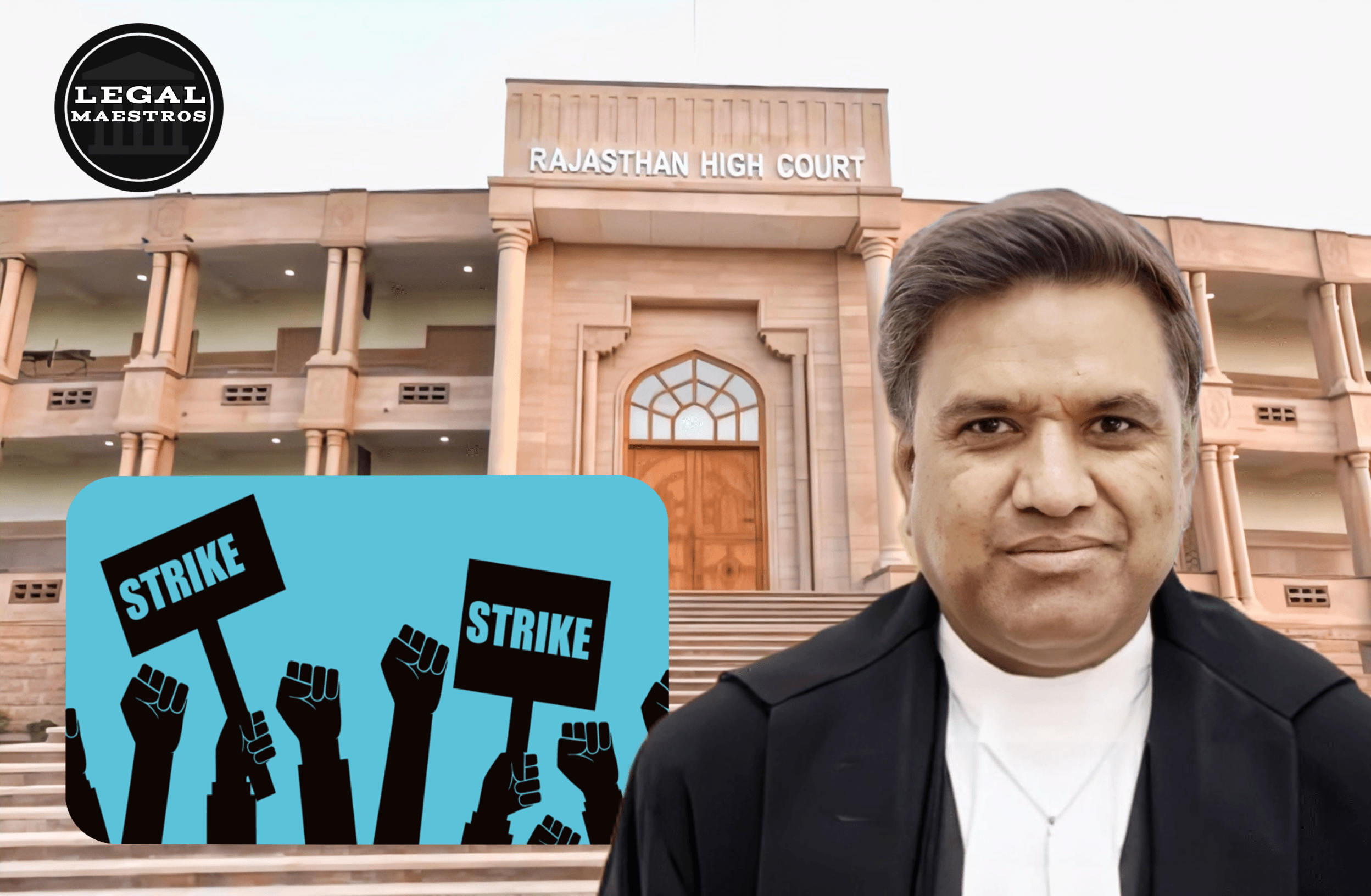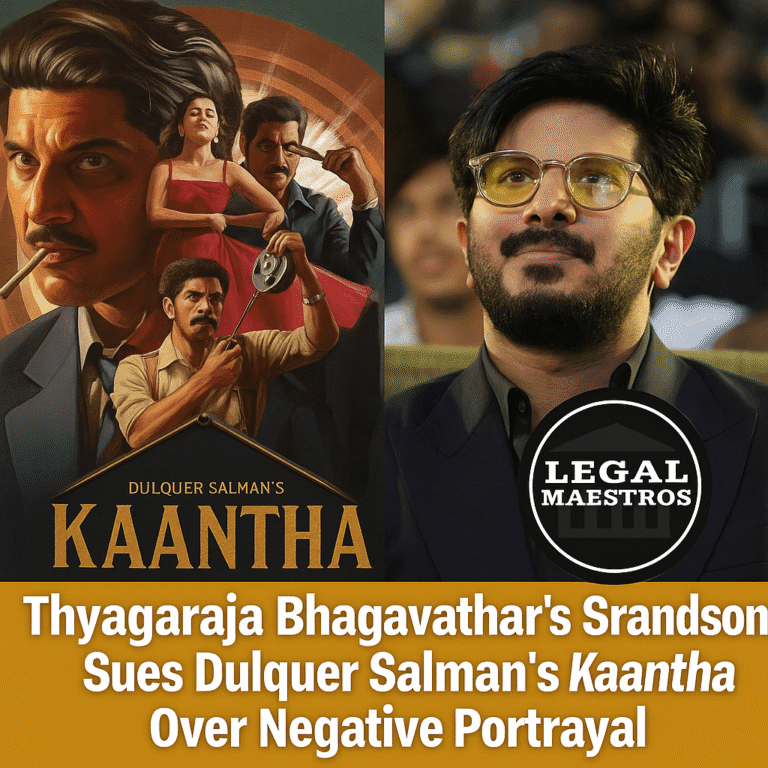
The High Court of Judicature at Rajasthan, Bench at Jaipur recently dealt with an important scenario of the indefinite strike by the employees of lower courts of Rajasthan. This exhaustive direction is given on July 24, 2025, by Hon lble Mr. Justice Ashok Kumar Jain discussing the nature of problems relating to the right to strike held by the government employees and their effect on the administration of justice.
The Situation of the Crisis: Employees Strike and Obliteration of Lower Courts
This case has arisen on the basis of two criminal miscellaneous suspensions of sentence applications that are S.B. Criminal Misc Suspension Of Sentence Application (Appeal) No. 1687/2024, Ibra @ Ibran vs State Of Rajasthan and S.B. Criminal Misc Suspension Of Sentence Application (Appeal) No. 1507/2024 Handu @ Devo @ Devilal vs State Of Rajasthan. In the process, lawyers in the court were able to inform the court that the courts were closed and there was no other alternative provision that could provide a litigant or a lawyer with a copy of a record. This meant that there was an all-round inconvenience due to the staff absence.
The essence of the matter was the strike in perpetuity (mass leave) by the officers of the District Court who had gone on strike on July 18, 2025 and had brought the running of the lower courts to a standstill in the state of Rajasthan. Initiation of this action by the Rajasthan Nyayik Karamchari Sangh (Sangh) whose State President, Mr. Surender Narayan Joshi, and the General Secretary, Mr. Pawan Pandit, brought a notice-cum-representation directly to Chief Minister of Rajasthan with the help of the Chief Secretary. According to the court, this was a grave conduct of indiscipline since the message was not channeled via Registrar General.
For any queries or to publish an article or post or advertisement on our platform, do call at +91 6377460764 or email us at contact@legalmaestros.com.
What added to this was that the staff did not even bother to intimation to the Honble Chief Justice regarding this mass leave nor did they give any information regarding the same and that too in a situation when there was a change on the Chief Justices office in Rajasthan recently. The former Chief Justice has been transferred and promoted to High Court of Madras and the latter Chief Justice of Madras High Court took over the reins on July 21, 2025. The Sangh did not even inform the High Court administration before they went on mass leave.
Fundamental Rights and Right to Strike: The View of the Judicial Eye
The case discussed by the court was strictly analyzed with the legal stand on the right of strike by government employees and lawyers. It has cited the case of T.K. Rangarajan Vs. 6 SCC 581 Government of Tamil Nadu (2003)
which firmly laid the foundation that there is no singular right by government servants under the Article 19(1(c) of the Constitution of India that they can enjoy right to strike. Besides, according to no statutory provision, can employees go on strike and such conduct cannot be caught on equitable grounds.
For any queries or to publish an article or post or advertisement on our platform, do call at +91 6377460764 or email us at contact@legalmaestros.com.
Going further in this, the court quoted Harish Uppal Vs. The Union of India (2003) 2 SCC 45
wherein the Supreme Court, in expanding the meaning of Article 21 (right to life and personal liberty, which implies the right to speedy justice), has laid down that the lawyers have no right to strike as it has negative impacts on fundamental rights of the litigants. This was one of the logical extensions of the court who could not understand how employees who get their living out of the coffers of the state could engage in strikes since even law professionals who form a vital component in the justice system could not.
In the order, discipline was called very important to the success of any institution especially the judiciary known to be very disciplined. The court then placed emphasis on the meaning of independence of the judiciary as conveyed by the Supreme Court to mean that, the judiciary is independent.
For any queries or to publish an article or post or advertisement on our platform, do call at +91 6377460764 or email us at contact@legalmaestros.com.
By Rajendra Singh Verma (D) Thr.Lrs vs Lt. Governor Of NCT Of Delhi & Anr (2011) 10 SCC 1, it shall be understood to mean that it is free of any influences but in order state that lies within a disciplined framework. This is communicating or seeking redressal not in a free style style as in the case of straight communication of the Sangh to the Chief Minister.
Policy Affairs and Restructuring of Cadre
The court has taken note of the fact that a meeting of the State Level Committee held by the judicial infrastructure had dealt previously on the question of “redressing the cadre strength of staff of subordinate Courts”. The High Court had already passed recommendation about redesigning of cadre strength and the same was forwarded to the State Government. A meeting of the State Government which was being convened under the Chairmanship of the Learned Chief Secretary was fixed to take place on July 25, 2025. This proved that the High Court had gone to an extent dealing with the demands of the staff using the right channels.
Notwithstanding this, the court has indicated that through the National Judicial Pay Commission the judicial employees were already receiving better salaries and emoluments than their similarly placed employees of the state governments who were enjoying the benefits of the 7 th Pay Commission.
For any queries or to publish an article or post or advertisement on our platform, do call at +91 6377460764 or email us at contact@legalmaestros.com.
About the issue relating to restructuring posts and cadre, the court has resorted to the case of P.U. Joshi & Ors. Vs. Union of India & Ors. Accountant General 2003 2156 Supreme Court AIR
. This case explained that finance is a sphere and an object of the State, and the question of the policy is beyond the jurisdiction of the judicial influence of the court. It was also ruled out that the workers in the states do not have the right to demand service conditions as per their will.
Order: Restoring Order in the “Temple of Justice”: Directives and Warnings
That since the abstention of work was against the law and unjustifiable, the court issued a stern warning in the form of an executive order to all the judicial employees of the District Judiciary to be ready to work by 10.00 AM on July 25, 2025. Non-compliance would attract a sequence of tight instructions.
For any queries or to publish an article or post or advertisement on our platform, do call at +91 6377460764 or email us at contact@legalmaestros.com.
The District Judges were to hold talks with District Collector and District Superintendent of Police to make sure that there are alternative working arrangements at the courts in case employees would not report by 10:30 AM, July 25, 2025. District Collectors were also instructed to give sufficient IT assistants and home guards (at least 12 th grade qualifications) to help the District Judges restart the court work. The District Judges too were to consult with the bar (or associations) in order to enlist voluntary and pro-bono services of the young lawyers in order to have access of justice by the needy.
More importantly, the court made it clear that should any record or document go missing during such interim designation, then the permanent employee who was posted at such seat would be regarded as culpable. It was also the directive of the District Judges to assure the safety of the people who joined duty or got employed on a temporary basis.
Under the order, the bar associations were also asked to support the District Judges with the point that the Bar and the Bench are the two wheels of the same chariot of justice. Employees who defied orders to report to work or rather those who incited others to remain on the mass leave were to be subjected to disciplinary action. District Judges were awarded with power to act on a Service Law regarding a transfer within the district, charge-sheets issued through Conduct Rules or suspension. Search also was made discreetly to detect those who were either catalysts or instigators of the agitation, and perhaps suspension, charge-sheets or transfer by the directive of the country out of district into the High Court.
For any queries or to publish an article or post or advertisement on our platform, do call at +91 6377460764 or email us at contact@legalmaestros.com.
The District Judges were to report to the Registrar General on a daily basis and he should evaluate the case before advising them. Such reports would be presented to the Hon. Chief Justice on July 28, 2025.
The Coming Danger of ESMA
The court actually said that unless the matter is improved by July 28, 2025 the Essential Services Maintenance Act (ESMA) would be used to restore discipline and restore court work. This law leads to keeping the supply of basic facilities and the government has a right to ban strikes in these areas. The court compared it to a case that has been captured in the Madras High Court where a bench in that court held that employees of the court who slowed work by going on strike against the functioning of the courts was against the rules since they were essential needs in administration, hence any judicial proceeding affecting the services, would result to disciplinary action under the Service Rules.
The order was categorical on this point and indicated that no matter what any given institution cannot accept the cases of indiscipline. The court left the option of giving more directions in situation where it was necessary. On July 29, 2025, the issue was up in the air.
For any queries or to publish an article or post or advertisement on our platform, do call at +91 6377460764 or email us at contact@legalmaestros.com.
This judicial action shows the highest value of judicial continuity and the restrictions of a right of people to strike especially in circumstances when the right to justice of citizens is threatened. The order acts as a stern command to the normality and discipline in the lower judiciary system of the state of Rajasthan.





![JOB POST: Junior Associate at ASM Law Chambers, Jaipur [Freshers]](https://legalmaestros.com/wp-content/uploads/2025/11/Gemini_Generated_Image_8wrxer8wrxer8wrx-768x708.png)


1 thought on “Rajasthan High Court Orders End to Court Staff Strike: Justice Ashok Kumar Jain Demands Immediate Return to Duty, Warns of ESMA Invocation.”